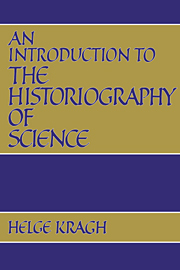Book contents
- Frontmatter
- Contents
- Preface
- 1 Aspects of the development of the history of science
- 2 History of science
- 3 Objectives and justification
- 4 Elements of theory of history
- 5 Objectivity in history
- 6 Explanations
- 7 Hypothetical history
- 8 Structure and organization
- 9 Anachronical and diachronical history of science
- 10 Ideology and myths in the history of science
- 11 Sources
- 12 Evaluation of source materials
- 13 Scientists' histories
- 14 Experimental history of science
- 15 The biographical approach
- 16 Prosopography
- 17 Scientometric historiography
- Notes
- Bibliography
- Index
13 - Scientists' histories
Published online by Cambridge University Press: 30 November 2009
- Frontmatter
- Contents
- Preface
- 1 Aspects of the development of the history of science
- 2 History of science
- 3 Objectives and justification
- 4 Elements of theory of history
- 5 Objectivity in history
- 6 Explanations
- 7 Hypothetical history
- 8 Structure and organization
- 9 Anachronical and diachronical history of science
- 10 Ideology and myths in the history of science
- 11 Sources
- 12 Evaluation of source materials
- 13 Scientists' histories
- 14 Experimental history of science
- 15 The biographical approach
- 16 Prosopography
- 17 Scientometric historiography
- Notes
- Bibliography
- Index
Summary
We have seen, as the examples involving Dalton and Galileo demonstrate, that scientists' own statements cannot really be accepted as the truth without further investigation. Such statements ought to be critically evaluated and approached with scepticism. In principle this applies to all evidence, even the most primary and direct sources such as diaries, private notes, oral statements and laboratory journals. We can never be absolutely certain that the scientist who makes notes in his diary while in the middle of making a discovery really did think and behave in the way he describes. The fact that it is always possible to raise doubts about the authenticity of any source is, however, a purely negative conclusion. In practice the historian has to accept some sources as trustworthy and is justified in doing so; namely, if no other source contradicts the information given in the source in question and if, furthermore, there are no reasonable grounds to doubt its authenticity. The evidence must then be accepted as reliable. At least until anything happens to affect this status, the source can become part of the fund of historical knowledge that acts as a check on the reliability of other sources.
In the present chapter we shall discuss the value and reliability of sources written by scientists who were themselves involved in the research on which the source throws light. It is already obvious from earlier examples (cp. Dalton) that the scientist is not always a witness to the truth when it comes to his own actions.
- Type
- Chapter
- Information
- An Introduction to the Historiography of Science , pp. 150 - 158Publisher: Cambridge University PressPrint publication year: 1987

